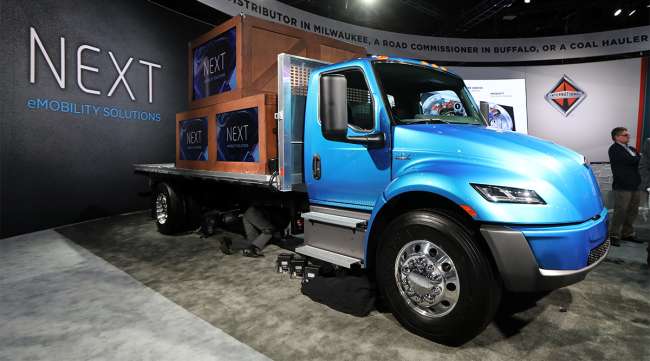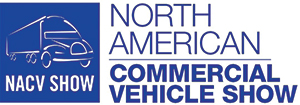Managing Editor, Features and Multimedia
Navistar Creates Electrification Business Unit, Unveils Battery-Electric Prototype

[Stay on top of transportation news: Get TTNews in your inbox.]
ATLANTA — Navistar announced it is forming a new business unit to support commercial vehicle electrification, solidifying the company’s previously announced plans to enter the emerging electric truck segment.
The manufacturer underscored that announcement by unveiling a battery-electric prototype based on its medium-duty International MV Series truck during an Oct. 28 press conference here at the 2019 North American Commercial Vehicle Show.
Navistar also touted the benefits of its alliance with global truck maker Traton Group.
That strategic alliance has given Navistar access to technologies that would have been very difficult for the company to develop on its own, said Navistar CEO Troy Clarke, who took the stage together with Traton CEO Andreas Renschler to discuss the partnership.
“We’re excited about how the alliance has helped us to achieve cost savings through global scale,” Clarke said. “It’s also given us a very cost-effective access to next-generation, leading technologies.”
Traton has announced plans to invest 1 billion euros in research and development for e-mobility, and another 1 billion euros in digitalization, including connectivity and autonomous driving.

CEOs Troy Clarke of Navistar (left) and Andreas Renschler of Traton by John Sommers II for Transport Topics
“I’m convinced in the next 10-15 years, one-third of our trucks and buses will have an alternative drivetrain, and most of those will be fully electric. And by the way, this is a very conservative ballpark figure,” Traton’s Renschler said. “And for this process, we are taking Navistar along.”
Navistar plans to begin production on medium-duty electric trucks under the International brand in early 2021.
The company said its new electric-vehicle business, named NEXT eMobility Solutions, will not only build electric trucks and buses, but also provide business consulting to support fleets as they deploy the zero-emission vehicles.
NEXT will develop customized implementation plans for each fleet customer’s unique operations, along with vehicle charging strategies and performance monitoring.
The business unit will be based in the Detroit area and headed by Gary Horvat, Navistar’s vice president for e-mobility. Horvat previously led technology development for Proterra’s electric bus product line and also worked with electric-vehicle systems at Denso International and Fisker Automotive.
The electric-powered eMV Series prototype unveiled at NACV is powered by an electric propulsion system that contains two motors in the same housing and provides peak power of over 474 kilowatts, or 645 horsepower.
The electric truck also features a redesigned aerodynamic hood with no grille for improved visibility.
Navistar unveils a battery-electric version of its International MV Series medium-duty model at #NACVShow2019. pic.twitter.com/4Wa1nabbbA — Seth Clevenger (@SethClevenger) October 28, 2019
The eMV was designed to accommodate three battery capacity options: 107, 214 or 321 kilowatt hours.
With the maximum battery capacity, the truck can travel up to 250 miles on a single charge in pickup and delivery applications, Navistar said.
In addition to its push into electrification, Navistar also intends to roll out more advanced driver-assistance technology.

Navistar's Persio Lisboa discusses plans for bringing Scania vocational trucks to Canada. (John Sommers II for Transport Topics)
Persio Lisboa, Navistar’s chief operating officer, said the company plans to offer a system capable of SAE Level 2 automated driving in the second half of 2020 for its on-highway trucks. Level 2 systems provide partial automation of braking, acceleration and steering, but still require the driver to remain engaged at all times.
In a separate development, Navistar announced it has signed a memorandum of understanding with Sweden-based truck maker Scania, a Traton subsidiary, to bring specialized Scania vocational trucks and services to mining operations in Canada.
Scania products would be distributed by Navistar and supported by a limited number of International Truck dealers in Canada.
Navistar also launched International 360, a fleet service communications platform designed to streamline truck maintenance and repairs.
The communications tool supports all truck makes and integrates with more than 24 telematics services providers through Navistar’s OnCommand Connection remote diagnostics system.
International 360 can consolidate disparate data feeds into a single interface, making it easier for fleets to view information about the status of their vehicles, said Friedrich Baumann, president of aftersales at Navistar.
“In modern trucking fleets, data is king,” he said.
Fleets can access International 360 online through a web portal, or integrate it directly into their fleet management systems.
Want more news? Listen to today's daily briefing:





